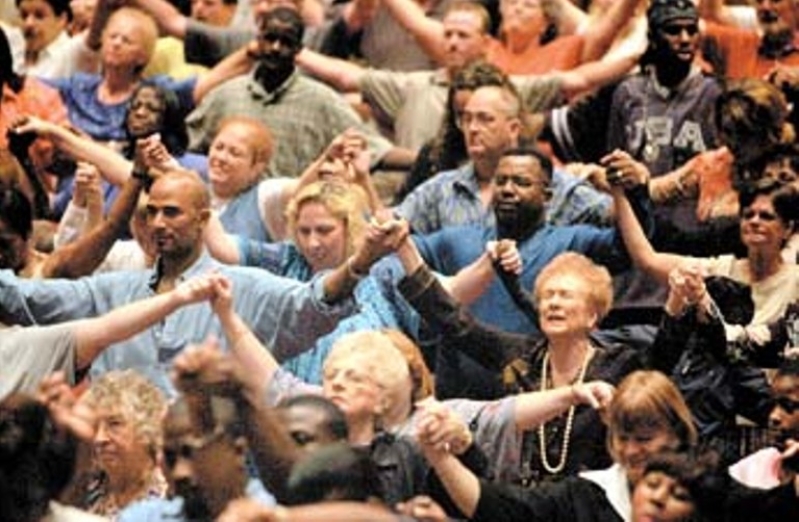
While not all Christians will recognize the Pentecost religious holiday as a holy day on May 15 this year, it generally is honored in liturgical churches whose congregations are Protestant, Roman Catholic, Anglican, Lutheran, Eastern Orthodox and Charismatic -- and of course, Pentecostal. Pentecost may not as well-known, or as popular as Christmas and Easter, though it commemorates a watershed event in Christian history typically marked as the birthday of the church.
For Christians, Pentecost is a holiday on which to commemorate the coming of the Holy Spirit on the early followers of Jesus, seven weeks after His resurrection. Before the events of the first Pentecost, which came a few weeks after Jesus' death and resurrection, there were followers of Jesus, but no movement that could be meaningfully called "the church." Thus, from an historical point of view, Pentecost is the day on which the church was started.
Pentecost being so important to the church also is true from a spiritual perspective, because the Spirit brings the church into existence and enlivens it, points out Rev. Dr. Mark D. Roberts on Patheos.
The English word "Pentecost" is a transliteration of the Greek word pentekostos, which means "fifty." It comes from the ancient Christian expression "pentekoste hemera," which means "fiftieth day." Christians basically borrowed the phrase from Greek-speaking Jews who used the phrase to refer to a Jewish holiday. This holiday was known as the Festival of Weeks, or, more simply, Weeks (Shavuot in Hebrew). This name comes from an expression in Leviticus 23:16, which instructs people to count seven weeks or "50 days" from the end of Passover to the beginning of the next holiday.
Pentecost is recorded in the New Testament book known as The Acts of the Apostles. Chapter 2 begins, "And when the day of Pentecost had come, [the first followers of Jesus] were all together in one place" (2:1). All of a sudden, a sound came from heaven, like a strong wind, filling the house where the people had gathered. Something like tongues of fire rested on their heads. "And they were all filled with the Holy Spirit and began to speak in other languages as the Spirit gave them the ability to speak" (2:4).
The languages spoken by the early Christians were intelligible, and were heard by thousands of Jewish pilgrims who had come to Jerusalem to celebrate Shavuot. The content of the miraculous messages had to do with God's mighty works (2:11). Many who heard these messages in their own languages were amazed, though others thought the Christians were just drunk (2:12).
At some point during this event, one of the leading followers of Jesus, Peter, stood up and preached his first sermon. He interpreted the events of that morning in light of a prophecy of the Hebrew prophet Joel. In that text, God promised to pour out his Spirit on all flesh, empowering diverse people to exercise divine power. This would be a sign of the coming "day of the Lord" (Acts 2:16-21; Joel 2:28-32).
Peter explained that Jesus had been raised and had poured out the Spirit in fulfillment of God's promise through Joel (2:32-33). When the crowd asked what they should do, Peter urged them to turn their lives around and be baptized in the name of Jesus. Then they would be forgiven and would receive the gift of the Holy Spirit (2:37-39). Acts reports that about 3,000 people were added to the church that day (2:41).
Pentecostal Christianity is believed by some to be the fastest-growing form of Christianity.
Churches that employ liturgical colors generally use red on Pentecost as a symbol of power and fire of the Spirit. Some churches receive new members on Pentecost, thus commemorating the first "new members class" that joined the church after Peter's Pentecost sermon.
Bible verses related to Pentecost include:
Acts 2:1 -- When the day of Pentecost arrived, they were all together in one place.
John 14:26 -- But the Helper, the Holy Spirit, whom the Father will send in my name, he will teach you all things and bring to your remembrance all that I have said to you.
Titus 3:5 -- He saved us, not because of works done by us in righteousness, but according to his own mercy, by the washing of regeneration and renewal of the Holy Spirit.
Acts 2: 14-16 -- Then Peter stood up with the Eleven, raised his voice and addressed the crowd: "Fellow Jews and all of you who live in Jerusalem, let me explain this to you; listen carefully to what I say. These people are not drunk, as you suppose. It's only nine in the morning!"
Acts 2: 42-47 -- They devoted themselves to the apostles' teaching and to fellowship, to the breaking of bread and to prayer. Everyone was filled with awe at the many wonders and signs performed by the apostles. All the believers were together and had everything in common. They sold property and possessions to give to anyone who had need. Every day they continued to meet together in the temple courts. They broke bread in their homes and ate together with glad and sincere hearts, praising God and enjoying the favor of all the people. And the Lord added to their number daily those who were being saved.






